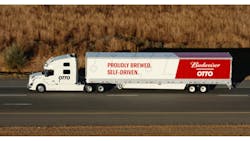Uber's Self-Driving Semi Makes First Beer Run
A self-driving truck from Uber's Otto division recently hauled a fully loaded trailer of Budweiser beer more than 120 miles on I-25 from Fort Collins, Colo., through Denver, to Colorado Springs, which Uber claims is one of first commercial shipments by self-driving truck.
A professional truck driver was in the vehicle for the entire route, monitoring the delivery from the sleeper berth as the truck completed the route – exit-to-exit – entirely on its own without any driver intervention. The load originated at Anheuser-Busch’s facility in Loveland, Colo., and departed for its journey from the Fort Collins weigh station.
“The incredible success of this pilot shipment is an example of what is possible when you deploy self-driving technology. It also showcases the importance of collaboration with forward-looking states like Colorado and innovative companies like Anheuser-Busch,” says Lior Ron, co-founder of Otto. “By embracing this technology, both organizations are actively contributing to the creation of a safer and more efficient transportation network.”
The pilot test coincides with Uber's announcement that it is launching an Uber Freight division for long-haul trucking.
One major opportunity for Otto’s technology is that drivers will be able to rest during long stretches of highway, and perhaps even catch up on sleep. That begs the question of whether the driver is “on-duty” with respect to hours of service laws while they are resting. To ensure the safety of all road users, these laws limit the number of hours truck drivers can work each day. Naturally, this also limits how much money drivers can make. Otto’s self-driving technology has the potential to extend productive hours without forcing drivers to choose between safety and earnings.
The companies said they embarked on this effort in response to the significant challenges facing the trucking industry. The shared vision for the self-driving technology is to transform this industry by:
- Reducing the number of fatalities on our roads. Nearly half of fatalities happen on highways, and 94% of accidents are caused by human error.
- Enabling fuel-efficient driving and therefore reducing emissions from freight trucks, which are currently responsible for 28% of all road vehicle CO2 emissions.
- Enhancing truck utilization and providing a sustainable solution for the driver shortage that continues to put pressure on drivers to work long hours at the risk of safe driving.
